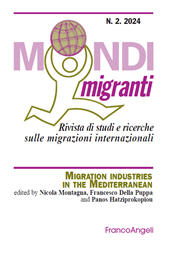The regularisation industry : a qualitative analysis of the legal-administrative intermediation field
85-107 p.
The bureaucratic management of the legal and administrative statuses of migrants is a pervasive yet scarcely researched aspect of the migratory experience. This article describes the field of intermediation services for migrants, with a particular focus on legal and bureaucratic support. Using the 2020 regu-larization of irregular migrant workers in Italy as a case study, it shows that actors related to this emerging segment of the "migration industry" are not only concerned with facilitating migrants' physical border crossings but also that intermediation services increasingly involve the crossing of internal borders, particularly between different (il)legal migration statuses. The article describes the field of legal-administrative status intermediation, highlighting the different actors involved, who differ widely in their legal competency and the degree to which they marketize their services.
The article argues that the combination of legal uncertainty and the specific features of the institutional and regulatory framework concerning intermediation services in Italy creates space for the emergence and expansion of forprofit actors. These actors oper-ate on a sliding scale between legal and illegal, formal and informal service-provision, ranging from commercial intermediation to illicit practices and fraud. Additionally, the article shows increasing forms of competition and ten-sion between non-profit and for-profit actors in the field. The analysis is based on 45 interviews with different actors of civil society, employers and migrants involved in the amnesty. The article looks at the migration industry as a field of intermediation in a context marked by the pandemic and on the forms of embeddedness of irregular migrants in local society. [Publisher's Text].
La gestione burocratica degli status legali e amministrativi dei migranti è un aspetto pervasivo ma scarsamente studiato dell'esperienza migratoria. Questo articolo descrive il campo dei servizi di intermediazione per i migranti, con particolare attenzione al supporto legale e burocratico. Utilizzando il caso di studio della Sanatoria del 2020 per la regolarizzazione dei migranti irregolari in Italia, si dimostra come gli attori legati a questo segmento emergente dell'industria della migrazione non si occupino solamente di facilitare il superamento fisico dei confini da parte dei migranti, ma di come i servizi di intermediazione riguardino sempre di più il superamento dei confini interni, in par-ticolare tra diversi statu migratori (il)legali. L'articolo descrive il campo dell'intermediazione dello status legale-amministrativo, evidenziando i diversi attori coinvolti, che differiscono ampiamente nella loro competenza legale e nel modo in cui monetizzano i loro servizi.
L'articolo sostiene che la combinazione di incertezza legale e le caratteristiche specifiche del quadro istituzionale e normativo riguardante i servizi di intermediazione in Italia crei lo spazio per l'emersione ed espansione di attori che agiscono a scopo di lucro. Questi operano su una scala variabile tra legale e illegale, formale e informale, che va dall'intermediazione economica a pratiche illecite e frodi. Inoltre, l'articolo mostra le forme crescenti di competizione e tensione tra attori non-profit e a scopo di lucro. L'analisi si basa su 45 interviste con diversi attori della società civile, datori di lavoro e migranti coinvolti nella Sanatoria. L'articolo esamina l'industria della migrazione come un campo di intermediazione in un contesto attraversato dalla pandemia e dalle forme di radicamento dei migranti irregolari nella società locale. [Testo dell'editore].
Ist Teil von
Mondi migranti : 2, 2024-
Artikel aus derselben Ausgabe (einzeln erhältlich)
-
Informationen
ISSN: 1972-4896
KEYWORDS
- industria delle migrazioni, intermediari, sanatoria, regolarizzazione, attori della società civile
- migration industry, intermediaries, amnesty, regularisation, civil society actors


